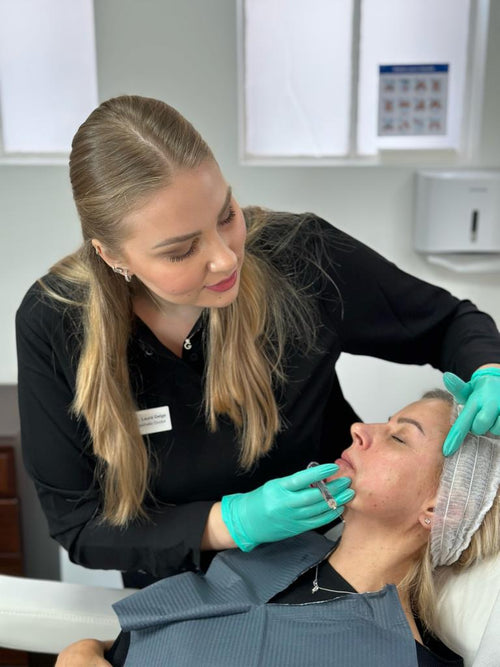Get Started with Dermal Fillers – Book with Dr. Laura Geige
Factors Affecting Longevity
Injection Technique
Many factors influence how long dermal lip fillers last, making it difficult to give a precise timeframe.
The type of filler used plays a significant role. **Hyaluronic acid (HA) fillers**, which are the most common type, typically last 6-18 months. **Permanent fillers** containing substances like collagen or PMMA can last several years, but they carry higher risks and are less reversible.
Individual metabolism also impacts longevity. Some individuals metabolize filler faster than others, leading to shorter-lasting results.
Lip anatomy and movement contribute to the breakdown of fillers. **Thin lips** with less natural volume tend to show results for a shorter period. Lips that are frequently moved during talking or eating can wear down the filler quicker.
Lifestyle factors, such as **sun exposure**, **smoking**, and **hydration levels**, can affect filler longevity. Sun damage can break down collagen and accelerate filler degradation. Smoking constricts blood vessels, hindering nutrient supply to the treated area.
**Injection technique** is crucial for maximizing results and longevity.
A skilled injector understands facial anatomy and will inject filler strategically, distributing it evenly and supporting the natural contours of the lips.
Proper cannula or needle insertion angle minimizes trauma to surrounding tissues, promoting better integration and longer-lasting effects. Avoiding overfilling is essential to maintain a natural look and prevent premature breakdown.
Book Your Dermal Filler Consultation with Dr. Laura Geige at It’s Me and You Clinic
Maintaining good skincare habits and following post-treatment instructions provided by the injector can also help prolong filler results.
Dermal Filler Type
Longevity of dermal lip filler results varies depending on several factors.
One primary factor is the individual’s metabolism and how their body processes and breaks down the filler material.
People with faster metabolisms may experience shorter-lasting results compared to those with slower metabolisms.
Lifestyle choices also play a significant role. Smoking, excessive sun exposure, and alcohol consumption can all accelerate the breakdown of dermal fillers.
Sun exposure breaks down collagen, which is naturally present in the skin and helps support the filler’s longevity.
Smoking constricts blood vessels, reducing blood flow to the treated area and affecting the filler’s integration into the tissue.
Additionally, facial movements and muscle activity can contribute to the degradation of lip fillers. Repeated expressions like smiling, talking, and kissing naturally cause movement in the lips, which can break down the filler over time.
The type of dermal filler used also significantly influences its longevity.
Hyaluronic acid (HA) fillers are generally less durable than poly-L-lactic acid (PLLA) fillers. HA fillers typically last 6-18 months, while PLLA fillers can last for 2 years or longer.
Within the HA category, different formulations and densities exist, each with its own estimated longevity. Thicker hyaluronic acid gels tend to last longer than thinner ones.
Furthermore, the skill and experience of the injector play a crucial role in maximizing filler longevity. Proper injection technique, placement, and amount of filler used can all influence how long the results last.
It’s important to remember that individual results may vary significantly, so it’s always best to consult with a qualified and experienced injector to discuss your expectations and determine the most suitable dermal filler options for you. They can provide personalized advice based on your specific anatomy, lifestyle, and desired outcome.
Individual Metabolism
Numerous factors influence the longevity of dermal lip fillers. These factors can be broadly categorized into individual characteristics, filler properties, and lifestyle choices.
Here’s a breakdown of how these factors contribute to the duration of lip filler results:
**Individual Metabolism:**
- Metabolic Rate: Individuals with faster metabolisms tend to break down hyaluronic acid fillers more quickly. This means that lip fillers may last a shorter time in people who metabolize substances at a rapid pace.
- Age: As we age, collagen production naturally declines. This can affect the longevity of fillers as the underlying skin structure weakens and loses its ability to support the filler.
- Genetics: Some individuals may be genetically predisposed to faster or slower breakdown of hyaluronic acid, influencing how long their lip fillers last.

**Filler Properties:**
- Hyaluronic Acid Concentration: Fillers with a higher concentration of hyaluronic acid tend to provide longer-lasting results as they offer more volume.
- Cross-Linking Density: Cross-linking refers to the chemical bonds that create a stronger, more stable gel network within the filler. Higher cross-linking density generally leads to longer-lasting results.
- Filler Formulation: Different brands and formulations of hyaluronic acid fillers may have varying properties that affect their longevity. Some fillers are specifically designed for longer-lasting results in areas like lips.
**Lifestyle Factors:**
- Sun Exposure: Excessive sun exposure can break down collagen and elastin, which weakens the skin and may cause filler to degrade faster.
- Smoking:** Smoking damages collagen and elastin, leading to premature aging and potentially affecting the longevity of lip fillers.
- Facial Expressions:**
- Hydration:**** Staying well-hydrated helps maintain skin elasticity and overall health, potentially contributing to better longevity of fillers.
Frequently making certain facial expressions can contribute to the breakdown of fillers over time. This is because repetitive movements can cause the filler to shift or disperse.
Maintaining Results
Lifestyle Choices
Maintaining the results of dermal lip fillers requires a multi-faceted approach that encompasses both lifestyle choices and diligent follow-up with your injector.
Here are some key strategies to help prolong the effects of your lip fillers:
-
Sun Protection: Excessive sun exposure can break down collagen and elastin, diminishing the longevity of filler results. Always apply a broad-spectrum sunscreen with an SPF of 30 or higher to your lips daily, even on cloudy days.
-
Hydration: Keeping your lips hydrated is crucial for maintaining their plumpness and suppleness. Drink plenty of water throughout the day and use a lip balm regularly.
-
Avoid Smoking: Smoking constricts blood vessels, hindering collagen production and potentially leading to premature filler degradation.
-
Limit Excessive Lip Movements: Repeated puckering or biting your lips can cause the filler to migrate or break down faster. Be mindful of your lip movements and try to avoid excessive tension on the treated area.
-
Healthy Diet: A balanced diet rich in fruits, vegetables, and omega-3 fatty acids supports overall skin health, including collagen production.
Additionally, regular touch-up appointments are essential to maintain optimal results. Your injector will determine the frequency of these appointments based on factors such as the type of filler used, your individual metabolism, and desired outcome.
By following these lifestyle recommendations and adhering to your injector’s advice, you can significantly prolong the beauty and benefits of dermal lip fillers.
Aftercare Instructions
Maintaining the beautiful results achieved with dermal lip filler injections involves a combination of lifestyle choices and diligent aftercare.
Here are some essential aftercare instructions to help you prolong your plump, luscious lips:
First 24-48 Hours:
-
Avoid touching or picking at the injection site. This can disrupt the filler and increase the risk of infection.
-
Minimize strenuous activities, heavy lifting, or excessive facial movements that could push on the injected area.
-
Refrain from applying makeup directly to the lips. Allow your lips to breathe and heal without irritation.
-
Stay hydrated by drinking plenty of water. This helps keep your skin supple and promotes healthy healing.
-
Apply ice packs for 10-15 minutes at a time, several times a day, to reduce swelling.
Following Week:
-
Continue to avoid touching or rubbing your lips.
-
You can gently cleanse your lips with a mild, fragrance-free cleanser.
-
Use a lip balm specifically formulated for sensitive skin to keep your lips moisturized. Avoid petroleum-based balms, as they can clog pores and irritate the injection site.
-
Be cautious with hot beverages and spicy foods as they may cause discomfort or irritation to the lips.
Long-Term Maintenance:**
-
Protect your lips from the sun by applying a broad-spectrum SPF lip balm every day. Sun damage can break down collagen and elastin, which contribute to lip volume and definition.
-
Maintain a healthy lifestyle with a balanced diet rich in fruits, vegetables, and antioxidants. Hydration is crucial for overall skin health.
-
Consult with your injector regularly for touch-up appointments to refresh the volume and maintain your desired lip appearance.
Regular Touch-ups
Schedule a Dermal Filler Consultation with Dr. Laura Geige
Maintaining the results of dermal lip filler, also known as a **lip plump**, requires a commitment to regular touch-ups.
The longevity of lip fillers varies depending on several factors, including the individual’s metabolism, lifestyle, and the type of filler used.
Generally, most dermal lip fillers last between *6* to *12 months*.
As the filler is gradually absorbed by the body, the lips will start to lose their fullness and definition over time.
This is where regular touch-ups come in.
They help to replenish the lost volume and maintain the desired lip shape and plumpness.
The frequency of touch-up appointments can be customized based on individual needs and desired results.
Some people may prefer to have touch-ups every *4* to *6 months*, while others might opt for longer intervals, such as *8* to *12 months*.
Consulting with a qualified and experienced injector is crucial for determining the optimal touch-up schedule.
Average Lifespan
Initial Duration
The duration of dermal lip filler results varies greatly depending on several factors, including the type of filler used, individual metabolism, lifestyle, and sun exposure.
Generally, dermal lip fillers last anywhere from 6 months to 2 years.
Here’s a breakdown of average lifespan for different types of fillers:
- Hyaluronic Acid (HA) Fillers: These are the most common type of dermal filler and typically last **6 to 18 months**. Popular HA fillers include Juvederm, Restylane, and Belotero.
- Calcium Hydroxylapatite Fillers:** These fillers tend to last longer than HA fillers, with results often lasting **1 to 2 years**. Examples include Radiesse.
Several factors can influence the longevity of lip filler results:
- Filler Type: As mentioned, different fillers have varying lifespans due to their unique compositions and how they interact with the body.
- Individual Metabolism: Some people metabolize fillers more quickly than others.
- Lifestyle: Smoking, excessive sun exposure, and frequent facial expressions can break down filler faster.
- Lip Movement: The lips are highly mobile, and frequent lip movements can contribute to filler degradation.
- Hyaluronic Acid Fillers: Typically last 6-18 months.
- Poly-L-lactic acid (PLLA) Fillers: Results can gradually build over several treatments, lasting up to 2 years or more.
- Calcium Hydroxylapatite Fillers: Often last around 1 year.
- Sun Protection: UV radiation degrades fillers faster. Always wear broad-spectrum sunscreen with an SPF of 30 or higher.
- Avoid Touching or Picking at the Lips: This can break down the filler and lead to uneven results.
- Maintain a Healthy Lifestyle: Smoking, excessive alcohol consumption, and poor diet can accelerate collagen breakdown and impact filler longevity.
It’s essential to consult with a qualified and experienced injector to determine the most appropriate type and amount of filler for your desired outcome and individual needs. Regular touch-up appointments are typically necessary to maintain the results of dermal lip fillers.
Potential for Extension
Average lifespan of dermal lip fillers varies greatly depending on several factors, including the type of filler used, individual metabolism, lifestyle, and sun exposure.
Generally, hyaluronic acid (HA) fillers, the most common type, last anywhere from 6 months to 2 years.
Here’s a breakdown by filler type:
While there’s no guaranteed way to extend filler longevity, some practices can help maximize results:
Remember that these are general guidelines. Individual results may vary. Consulting with a qualified and experienced injector is crucial for personalized advice and treatment plans.
I Like Corbyn But I Like Corbyn But Tableau Consulting LLC Dr. Nerina Muses
- Why Breadcrumbing Is A Form Of Emotional Neglect In Dating - November 13, 2025
- What Is The Alternative To Tear Trough Filler? - November 10, 2025
- What Age Is Best To Get Filler? - November 9, 2025
